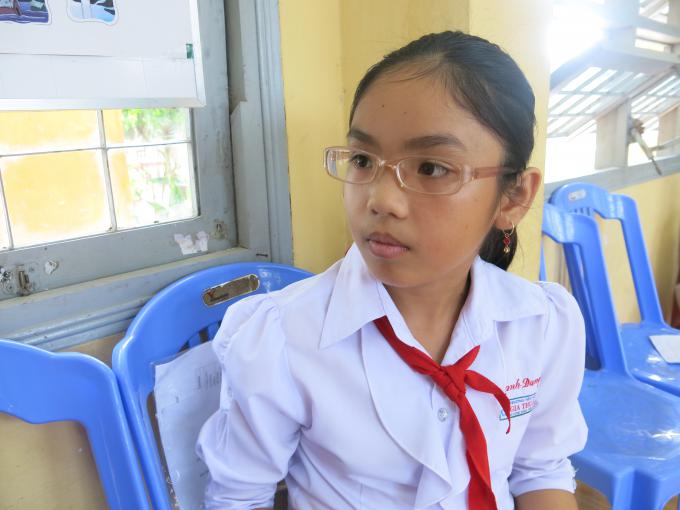Children as Agents of Change
“I like the club because we learn about how to adapt to climate change and have swimming lessons so we can stay safe if there is a flood. This is my second year in the club.” explains Nguyen Ai Hanh Dung, class 5/2 of Gia Thuan primary school in Tien Giang.
Children’s club meetings are held monthly or bimonthly in both the community, targeting out of school and vulnerable children, and in schools. These child-led sessions encourage all children to work together on climate change awareness raising and to become agents of change in the classroom, school and community.
This year Dung has been selected for Club President, and on this particular day she actively chairs activities around “Practicing skills to adapt to climate change”. Club members perform a role play about actions to adapt to climate change, take part in a game matching ‘do’s’ and ‘don’ts’ for reducing climate change, and draw a vision pictures of their dream school, in consideration of likely changes in climate. change.
Besides the important knowledge they are gaining, Dung believes the best thing about the club is being able to organize fun activities for her friends to help them learn and build their confidence to share information, plan and promote change within their community. What she has learned at the club is also shared with her family at home. “I’ve told my family that we need to grow trees to help the environment and reduce climate change”. Dung has also taught her family about what to do if they are caught in the middle of a storm or a whirlwind. When asked about the future, she said “I’d like to help more and more friends and their families learn how to adapt to climate change and reduce activities that lead to global warming.”
To promote child-led knowledge sharing and build resilience of families to cope with climate change , children in Tieng Giang are also participating in a household energy and water saving campaign. After collecting their home electricity and water bills and examining their family’s resource consumption, children are taught resource saving actions like turning off lights and electrical equipment, ensuring water taps are tightly closed and re-using water. Children share their learning’s with their families and put knowledge into practice within their own homes. Each subsequent month children analyse their bills to monitor progress in reducing their usage.
In the first three months of this project over 8.4 million Vietnam Dong (AU$514) was saved across participating communities; a huge saving for families and the environment, achieved by children. Furthermore, it is hoped that the knowledge and skills children have gained during this action campaign will remain with them for life, by saving resources and money children are learning to building the capacity of households to cope with unforeseen impacts of climate change.
The children’s club and home assessment are part of a broader Save the Children’s “Child -Centered Climate Resilience” in Tien Giang Province which aims to support children and their communities to manage the impacts of climate variability and to increase the government body’s responsibility in meeting the needs of vulnerable children and communities.
 Vietnam
Vietnam 